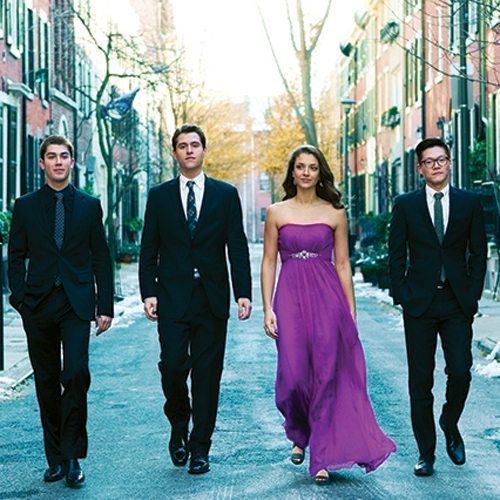Dover Quartet brings fire and elegance to adventurous program

For the penultimate evening of the Winter Chamber Music Festival, it was the turn of the Dover Quartet to take the stage Friday night at Pick-Staiger Hall in Evanston.
Ensemble in residence at Northwestern University’s Bienen School of Music, the youthful group also brought along one of the most smartly conceived programs of this year’s series—flanking a Mozart quartet with rarities by Arnold Schoenberg and Alexander von Zemlinsky.
The pairing makes eminent sense, musically and historically, as the two composers were lifelong friends and close colleagues. Older by three years, Zemlinsky taught Schoenberg counterpoint and consistently encouraged his musical development. Their bond was cemented when Schoenberg married Zemlinsky’s sister Mathilde, though their friendship later grew strained when the couple divorced.
Schoenberg’s Quartet in D major is an early work (written in 1897 and lost until 1966) and one that the composer apparently regarded as juvenilia since he never included it among his later numbered quartets.
The work hails from a time when Schoenberg was still trying to find his voice within traditional tonal forms. If the style suggests Dvořák at times, it should, with some outright near-cribs from the Czech composer’s “American” Quartet.
If Dvořák’s clothes don’t seem a convincing fit for Schoenberg, this innocuous work is enjoyable enough on its own slender, somewhat derivative merits and made a fine opener for the evening. The Dover members brought out the rustic charm with refined tone and seamless ensemble, playing with bracing clarity even in the most hectic contrapuntal passages. In the note-bending phrase ends of the Andante’s main theme, they managed to convey the feeling of Schoenberg’s serialism coming intermittently into view on the horizon.
Surprisingly, the minor-key angst on the first half came not from Schoenberg but from Mozart. Continuing this year’s ongoing exploration of his “Haydn” quartets, Mozart’s Quartet in D minor, K.421 was the evening’s centerpiece.
The Dover Quartet is a well-balanced group, possessing an uncommonly refined corporate timbre. The group sonority tends to favor the violins, but with a first violinist as terrifically gifted as Joel Link, who can complain?
The players dug into the drama of the outer movements without sacrificing their polished tone or losing an essential Rococo elegance. The Andante was lovely, rendered with lilting grace; the stormy quality of the Menuetto proved as driven and edgy as its tick-tock trio was piquant and charming. The Dover members had the final set of variations fully in their kit, playing the main theme with gracious insistence and consistently underlining the score’s unease with an almost violent desperation.
Zemlinsky’s String Quartet No. 2 made up the entire second half. In her user-friendly introduction, violist Milena Pajaro-van de Stadt traced the work’s history as well as how the relationship between Schoenberg and Zemlinsky, at least in part, inspired the work. She also firmly planted her flag for this score, calling the Second Quartet a “grossly underplayed, absolute masterpiece.”
I’m not sure I would go quite that far, but Zemlinsky’s String Quartet No. 2 is certainly a powerful and compelling work that deserves to be far better known. Cast in a single movement of 40 minutes, Zemlinsky seems to have taken his outward inspiration from Schoenberg’s Quartet No. 1 in D minor, written several years earlier and also cast in a long single movement.
If Mahler had ever written a mature string quartet it would likely sound something like this. Zemlinsky stays on the traditional side of tonality, yet this constantly evolving music flirts with atonal discords in its pensive, brooding fashion. The music is always on the move and holds one’s interest throughout—vaulting from surging, impassioned sections that recall Schoenberg’s Verklärte Nacht, to yearning, dark-hued lyricism and harmonic buzzing that seems to anticipate Ligeti. Near the end of this long journey, a theme of great lyrical warmth take flight and the music slowly winds down to a quiet, peaceful coda.
Kudos to the Dover Quartet for their adventurous program and their remarkable advocacy of Zemlinsky’s challenging score, which made the strongest possible case for this rewarding music.
The Winter Chamber Music Festival concludes Sunday with “Shared Madness,” two programs of contemporary music by violinist Jennifer Koh 3 p.m.. and 7:30 p.m. at Pick-Staiger Hall. events.music.northwestern.edu
Posted in Performances




